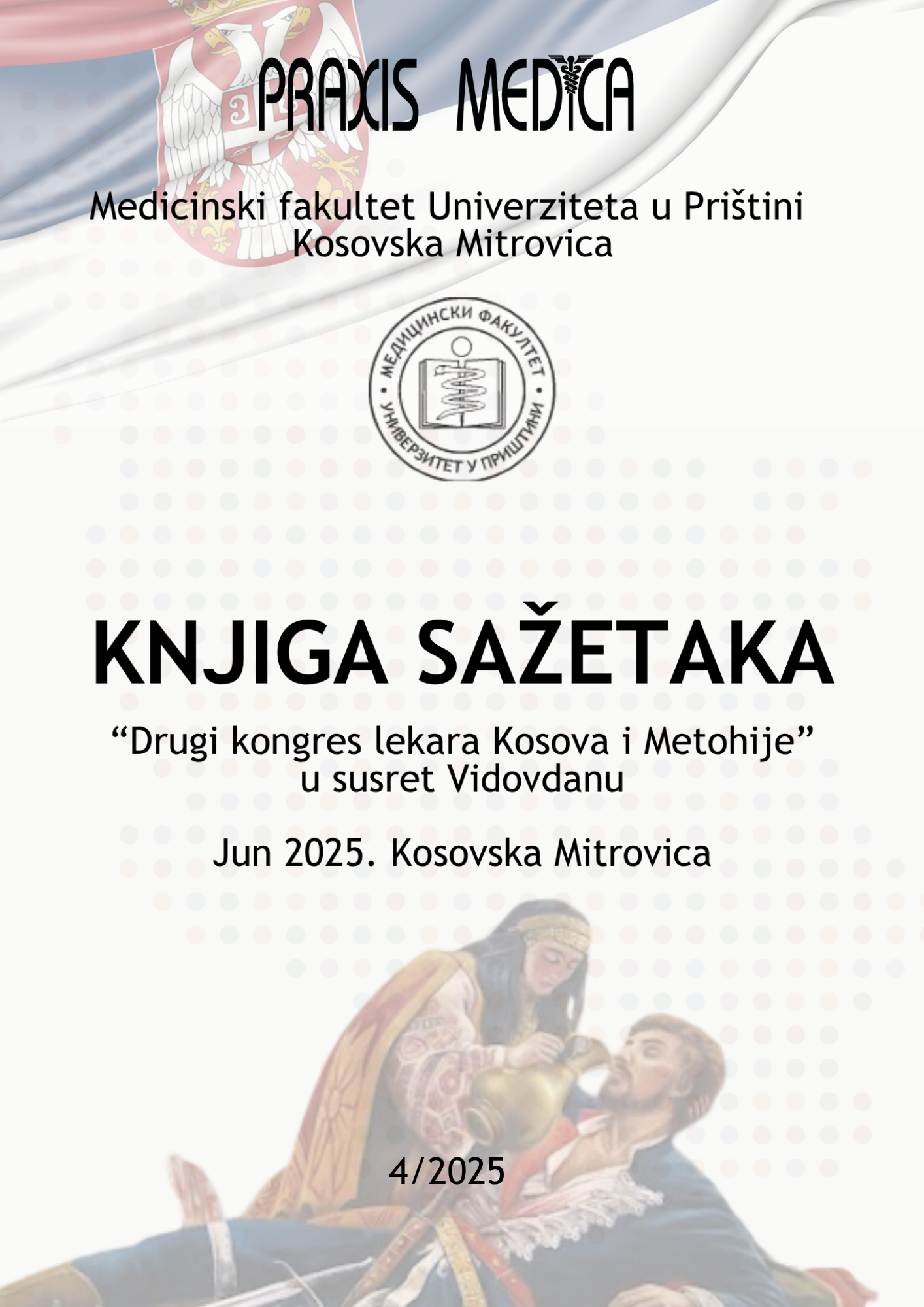Current issue

Volume 53, Issue 4, 2025
Online ISSN: 2560-3310
ISSN: 0350-8773
Volume 53 , Issue 4, (2025)
Published: 30.06.2025.
Open Access
All issues
Contents
30.06.2025.
Professional paper
ULOGA MITOHONDRIJA U PATOGENEZI FOTOSTARENJA KOŽE
Uvod: Fotostarenje – spoljašnje, prerano starenje kože je kumulativni proces zavisan od ponovljenog ili kontinuiranog izlaganja ultravioletnom (UV)
zračenju i fototipa kože. UVA (320–400 nm) zračenje se smatra primarnim faktorom fotostarenja. Mehanizam fotooštećenja zasniva se na ekscesivnoj
produkciji reaktivnih vrsta kiseonika (engl. reactive oxygen species, ROS) i sledstvenom oksidativnom stresu, koji vodi poremećaju fizioloških funkcija
ćelija kože. Jedan od najvažnijih faktora fotostarenja je oksidativno oštećenje mitohondrija.
Glavni deo rada: Mitohondrije su esencijalne ćelijske organele uključene u proizvodnju energije i održavanje ravnoteže između proizvodnje ROS-a i
antioksidativne zaštite. One su glavni intracelularni izvor UV- zračenjem indukovanih ROS-a, koji dovode do oksidativnih oštećenja lipida, proteina,
jedrove i mitohondrijalne DNK (mtDNK) i pokreću patološke procese kao što su inflamacija, imunosupresija i karcinogeneza. Oksidativnim oštećenjima
je naročito podložna mtDNK, koja iskazuje i do 15 puta veću stopu mutacija i manje efikasan mehanizam popravke u poređenju sa jedrovom DNK.
Akumulacija mutacija na mtDNK dovodi do značajne mitohondrijalne disfunkcije, poremećaja na nivou respiratornog lanca, remeti održavanje
ravnoteže mitohondrijalne dinamike, podstiče apoptozu ćelija, što rezultira fotooštećenjem kože. ROS takođe indukuju aktivaciju serije enzima,
matriksnih metaloproteinaza (MMP) zaduženih za razgradnju proteina ekstracelularnog matriksa dermisa kože, koji stvaraju platformu za razvoj
kliničkih znakova fotostarenja, bora, dubokih kožnih nabora i gubitka elasticiteta kože. Histološki, fotoostareli epidermis karakteriše se atipijom
ćelija, prisustvom diskeratoze, hiperkeratoze, nepravilnim rasporedom pigmentnih granula, promenama u strukturi dermo-epidermalnog spoja.
Oštećenje i dezorganizacija kolagenih vlakana, gubitak zrelog i smanjnje sinteze novog kolagena, kao i prisustvo solarne elastoze uočavaju na nivou
dermisa. Primena topikalnih fotoprotektivnih preparata je zlatni standard za prevenciju fotooštećenja kože izazvanih ROS.
Zaključak: Mitohondrijalna disfunkcija je ključni faktor u patogenezi fotostarenja kože. Razumevanje uloge mitohondrija u fotooštećenju, pruža nam
uvide u mogućnost razvoja novih metoda prevencije i tretmana fotostarenja kože.
Ključne reči: mitohondrijalna disfunkcija, mtDNK, ROS, UV zračenje, fotostarenje
Slađana Savić
01.12.2021.
Professional paper
Students' attitudes about the quality and effectiveness of online compared to traditional teaching of histology and embryology during the COVID-19 pandemic
INTRODUCTION: The corona virus desease has led to numerous changes in all aspects of our lives. The educational system through numerous innovative learning methods managed the smooth conduct of distance learning. OBJECTIVE: The aim of our study is to examine the attitudes of medical and dental students about quality and effectiveness of online versus traditional teaching, in the course of Hystology and Embriology during the duration of the COVID-19 pandemic. METHODS: The research was conducted online, with the help of a questionnaire designed on the Google Forms platform. The cross-sectional study included second-year students of medicine and dentistry at the Faculty of Medicine in Priština -Kosovska Mitrovica, who during the 2020/21 academic year followed online and classical classes in the subject Histology and Embryology. The results were processed using descriptive statistical methods and appropriate tests for testing the hypothesis about the significance of the difference between two, three or more samples. RESULTS: Out of the total number of surveyed students (n=60), 95% of students attended traditional classes, 88.3% of students attended classes via Zoom platform, while 85% of respondents used Moodle platform. The highest percentage of very satisfied (38.3%) and satisfied (51.6%) students was with traditional teaching. The percentage of available lecturers during online classes is 73.3%, and 76.7% during tradicional teaching. 75% of students believe that tradicional teaching can not be replaced by online teaching method. 68% of students used the literature and available presentations on the Moodle platform to prepare for the exam. A significant correlation was found in the case of satisfaction with the grade and the achieved success in the exam (p=0,001). CONCLUSION: The results of our research show that students preferred traditional over online teaching, which makes traditional teaching a primary and irreplaceable form of education.
Teodora Jorgaćević, Slađana Savić, Jelena Tomašević, Erdin Mehmedi, Milica Perić, Sanja Gašić
01.12.2020.
Professional paper
Respiratory epithelium: Place of entry and / or defense against SARS-CoV-2 virus
Coronavirus Disease (COVID-19) is caused by the RNA virus SARS-CoV-2. The primary receptor for the virus is most likely Angiotensin-converting enzyme 2 (ACE2), and the virus enters the body by infecting epithelial cells of the respiratory tract. Through the activation of Toll Like Receptors (TLRs), epithelial cells begin to synthesize various biologically active molecules. The pathophysiology of the COVID 19 is primarily attributed to the hyperactivation of host's immune system due to direct damage to the cells, with consequent release of proinflammatory substances, but also due to the activation of the innate immune response through the activation of alveolar macrophages and dendrite cells (DC). A strong proinflammatory reaction causes damage to alveolar epithelial cells and vascular endothelium. Respiratory epithelial cells, alveolar macrophages and DC are likely to be the most important cells involved in the innate immune response to the virus, since prolonged and excessive SARS-CoV-2-induced activation of these cells leads to the secretion of cytokines and chemokines that massively attract leukocytes and monocytes to the lungs and cause lung damage.
Snežana Leštarević, Slađana Savić, Leonida Vitković, Predrag Mandić, Milica Mijović, Mirjana Dejanović, Dragan Marjanović, Ivan Rančić, Milan Filipović





